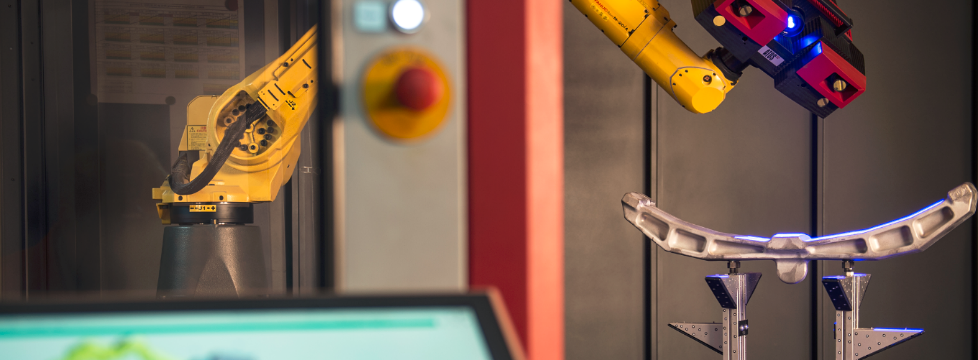- Artificial intelligence (AI) identifies quality deficiencies and improves manufacturing processes in the forging industry
- The latest simulation models calculate processes in a fraction of a second
- “Explainable AI” strengthens trust in intelligent systems and reduces environmental pollution
in production
Before a passenger aircraft can take off from the ground at a speed of up to 345 km/h, perfect interaction of all technical components must be ensured. Every component has a task and is the result of a complex manufacturing and process chain. Manufacturing in the aircraft industry is one of the most accurate in the world. The safety-critical components, such as drop forged parts made of high-alloy steels, titanium and nickel-based alloys, are subject to very strict safety and quality criteria
Defective components pollute the environment and are costly and time-consuming
“As a leading developer and manufacturer of heavy-duty and safety-critical drop forged parts for the aviation industry and other branches of industry, we consider smooth manufacturing and production processes our top priority. If there are deviations from the technical planning defined in the product development, components must either be rejected, reworked or scrapped. This is not only costly and time-consuming, but it also requires a lot of energy and pollutes the environment. With the help of AI, we want to understand the causes of quality deficits in production in order to avoid them or at least identify deviations that occur at an early stage in order to be able to take appropriate countermeasures in the subsequent processes,” said Dr. Gerhard Gerstmayr, Technical Director of voestalpine Böhler Aerospace.
In the field of production, simulation models are used to map and analyze processes. For the leading supplier to the aviation industry voestalpine Böhler Aerospace and the consortium leader in the BrAIN research project, Know-Center is developing an intelligent and adaptive AI model. The system should be able to support technicians by helping to develop strategies for avoiding errors and reacting individually to errors in the manufacturing process. In addition, it supports experts in decision-making and optimization measures, for example, by making suggestions on machine settings.
High-tech simulations replace time-consuming “numerical” simulations
Numerical simulation models are typically used to simulate production processes. These are very computationally intensive, and complex process simulations such as those in the forging industry often require up to a week of computation time. In order to save this time and the associated costs, latest high-tech approaches are required.
“Using hybrid simulation models, a combination of machine learning and numerical models, we can carry out simulations in a fraction of a second,” explained Ass. Prof. Roman Kern, Head of the Knowledge Discovery Area at Know-Center. That saves the company quite a bit of development time and costs. In addition, the data science and machine learning methods used are not limited to the calculation of predictions, but can also actively generate decision suggestions. Using the developed models, we will be able not only to analyze individual process steps, but also map the production process in its entirety.”
AI provides comprehensible suggestions for domain experts
Prof. Stefanie Lindstaedt, CEO of Know-Center, said: “Especially in security-critical areas, it is necessary to rely on the latest AI technologies. This is the only way we can ensure technological advancement and still protect the environment and resources. With the help of technologies, such as explainable AI, AI systems support experts by making understandable suggestions. This promotes trust in and acceptance of these high-tech methods on the part of technical personnel and at the same time secures the company’s decisive market advantage.”
Big data and AI are not yet widespread in the forging industry since its manufacturing processes are far more complex than those in other industries and highly safety-critical. The hybrid models can be used for any industry that uses numerical simulations and sensor data.
Further information about the project: http://brain.know-center.at/
About Know-Center
Know-Center is one of the leading European research centers for Data-Driven business and AI. Since 2001, well-known companies have been supported by using data as a success factor for their business. As an integral part of the European research landscape, the center successfully handles numerous projects and contract research at EU- and national level. The K1 Competence Center, which is funded under COMET, is the leading training center for data scientists in Austria and provides a range of AI training and consulting services to companies. Know Center‘s majority shareholder is Graz University of Technology, a major contributor to domestic AI research, whose institutes handle numerous projects together with Know-Center. In 2020, Know-Center was the only Austrian center to receive the BDVA iSpace Gold Award, which has only been awarded nine times throughout the entire EU so far. https://www.know-center.at
About voestalpine Böhler Aerospace
voestalpine BÖHLER Aerospace GmbH & Co KG is a global development partner and leading supplier of heavy-duty drop forged parts made of titanium alloys, high-alloy steels and nickel-based alloys. As a leading developer and manufacturer of customer-specific, safety-critical forged parts, the company produces high-quality components for the aviation industry and other high-tech branches of industry and supplies over 200 technologically advanced customers worldwide. https://www.voestalpine.com/bohler-aerospace/de/

